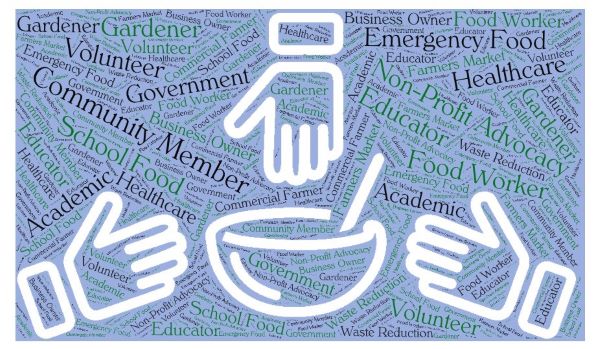October 13, 2020

This summer, Common Ground Health, Foodlink, and the City of Rochester, received a two-year grant from the Healthiest Cities and Counties Challenge (HCCC). These funds will be used for community outreach and planning for a Rochester Food Policy Council. In August 2020, the partners joined with resident leaders to host three virtual public meetings, titled Food For Thought. The purpose of Food For Thought was to provide information on the grant project, an overview of food policy councils, and opportunities for people and organizations to begin getting involved.
Attendance
Over 300 people registered for Food For Thought, and over 180 were able to log in to a meeting. Nearly 75% of registrations came from Rochester zip codes. Another 20% were from Monroe County suburbs. Zip codes 14620 and 14609 had the largest number of registrations. The registration form also asked people to share where they see themselves in the food system. Many people identified as shoppers/consumers and gardeners. Emergency food workers, non-profit advocacy, and volunteers, were also popular choices. There was also representation from food businesses and workers, schools, nutrition and garden educators, healthcare, farmers markets, farmers and government.
Community Assets & Challenges
Participants identified a number of community assets that represent opportunities for a Food Policy Council to include key stakeholders, and to design policies that build on the great work already being done in and around Rochester. Over a dozen comments cited either urban agriculture and community gardens, Rochester Public Market, emergency food providers, and Foodlink. Local agriculture, Headwater Food Hub, and farmers markets were also mentioned by many participants. Other participants pointed out the work being done by Flower City Pickers, Taproot Collective, Grow Green, Green Visions, and other small organizations.
Attendees cited inequity as the most common challenge in Rochester's food system. Many people mentioned that too many Rochester residents lack access to quality, healthy food that they can afford. Participants were also concerned about the prevalence of junk food in neighborhoods, diet-related disease, food system workers’ rights, farmland development, and the natural environment.
Key Stakeholders and Focus Areas

Participants recommended these key stakeholders to help create the Food Policy Council.

Recommended food policy council areas of focus
Next steps
Rochester needs diverse community voices to help decide things such as how many people will be on the Food Policy Council and how decisions will be made. The HCCC team will use the rest of 2020 to plan community engagement opportunities and involve more people in the planning. This project is focused on the City of Rochester, but all those who care about the local food system are welcome to participate, even if they live outside the city. In 2021, our community should be ready to form its Food Policy Council and begin the work of transforming our city’s policies to create a more equitable and healthy food system.
If you have thoughts on this process or want to be involved, please email rocfoodpolicy@gmail.com.

